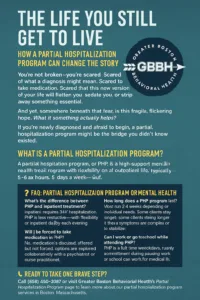You’re not broken—you’re scared. Scared of what a diagnosis might mean. Scared to take medication. Scared that this new version of your life will flatten you, sedate you, or strip away something essential.
And yet, somewhere beneath that fear, is this fragile, flickering hope: What if something actually helps?
If you’re newly diagnosed and afraid to begin, a partial hospitalization program might be the bridge you didn’t know existed.
What Is a Partial Hospitalization Program?
A partial hospitalization program, or PHP, is a high-support mental health treatment format that blends the structure of inpatient care with the flexibility of outpatient life. You participate in therapeutic programming most of the day—typically 5 to 6 hours, 5 days a week—but return home or to a safe housing situation each evening.
That means you can receive intensive therapy, psychiatric care, medication management, and skill-building work without committing to a full hospital stay.
In a place like Greater Boston, where life moves fast and stigma can make it hard to ask for help, PHP gives you a chance to breathe and rebuild with dignity.
Why PHP Is Ideal When You’re Scared to Take Medication
If you’ve just received a diagnosis like depression, bipolar disorder, anxiety, or OCD, medication might be part of your treatment plan—but no one’s forcing it. And for many people, fear of medication isn’t irrational—it’s about agency, identity, and the unknown.
What if I feel numbed?
What if it changes who I am?
What if I lose the parts of me that matter most?
In a PHP setting, those fears are not only allowed—they’re explored, validated, and respected. You have time to talk to your prescriber. You’re not rushed into decisions. And if you do decide to start a medication, you’ll be closely supported while your body and mind adjust. You don’t have to “just take it.” You get to consider, decide, and participate.
Real People, Real Shifts
We once had a young client—let’s call her Sam—who came to us with zero intention of engaging. She told her intake therapist, “I’m here because my psychiatrist said I had to do something. I’m not even sure I believe in this stuff.”
By the end of her third week in PHP, she wasn’t just participating—she was helping someone else in group make sense of a panic spiral.
“I didn’t want to be here. But now, I don’t want to leave—not yet.”
– PHP Client, 2024
Sam didn’t change because someone convinced her. She changed because the space gave her room to question, to stay curious, and to slowly find her footing again. That’s what PHP can do.
Therapy in Real Time, Not in a Vacuum
What sets PHP apart isn’t just the number of therapy hours—it’s the pace and purpose behind them. You’re not popping in for 45 minutes once a week, hoping it sticks. You’re doing the real work, with daily continuity and a whole team backing you.
Expect:
- Group therapy that mirrors real-life challenges and social dynamics
- Individual sessions where your clinician actually gets to know your story
- Medication management that respects your autonomy
- Skill-building for anxiety, emotional regulation, boundary-setting, and more
And you do all this while still living at home. You apply what you’re learning immediately, which means the growth sticks.
Is This the Right Level of Care for Me?
You don’t need to be in crisis—but you do need more than weekly therapy. PHP is often ideal for people who:
- Just received a diagnosis and feel emotionally overwhelmed
- Are stepping down from an inpatient or residential program
- Need support integrating a new medication or treatment plan
- Have tried outpatient therapy but still feel unstable or unsure
- Want structure and safety while they stabilize
If you live in or near Dedham, Needham, or Newton, Greater Boston Behavioral Health offers PHP access with trauma-informed clinicians, evidence-based modalities, and flexible pathways.
What Happens After PHP?
PHP isn’t a forever home. It’s a solid landing pad—a chance to stabilize, learn, and prepare for longer-term wellness. After PHP, most people “step down” into an intensive outpatient program (IOP) or return to weekly outpatient therapy with a clearer sense of what they need and how to ask for it.
The goal isn’t to stay in treatment forever. It’s to learn what helps, practice it consistently, and feel confident taking the next step.
The Life You Still Get to Live
That’s what this is really about. You don’t start PHP because something is wrong with you. You start because something inside you knows you want to feel better—and you’re finally ready to try something different.
Yes, you’re scared. Yes, it’s messy. But you’re allowed to take small, honest steps toward a life you actually want to be in. PHP is one of those steps.
FAQ: Partial Hospitalization Program for Mental Health
What’s the difference between PHP and inpatient treatment?
Inpatient treatment requires 24/7 hospitalization. PHP is less restrictive—you attend treatment during the day but return home each evening. It allows for intensive care without full hospitalization.
Will I be forced to take medication in PHP?
No. Medication is offered and discussed, but not forced. You’ll work collaboratively with a psychiatrist or nurse practitioner to explore options at your own pace.
How long does a PHP program last?
Most PHPs run 2–4 weeks depending on individual needs. Some clients stay longer if their symptoms are complex or if they need more time to stabilize.
Can I work or go to school while attending PHP?
PHP is a full-time commitment during weekdays, which may temporarily pause work or school. However, many employers and schools are willing to accommodate medical leave for mental health treatment.
Is PHP covered by insurance?
Often, yes. Many commercial insurance plans cover PHP as a medically necessary service. Greater Boston Behavioral Health can verify your benefits and help with prior authorization.
Ready to Take One Brave Step?
Call (888) 450-3097 or visit Greater Boston Behavioral Health’s Partial Hospitalization Program page to learn more about our partial hospitalization program services in Boston, Massachusetts.


